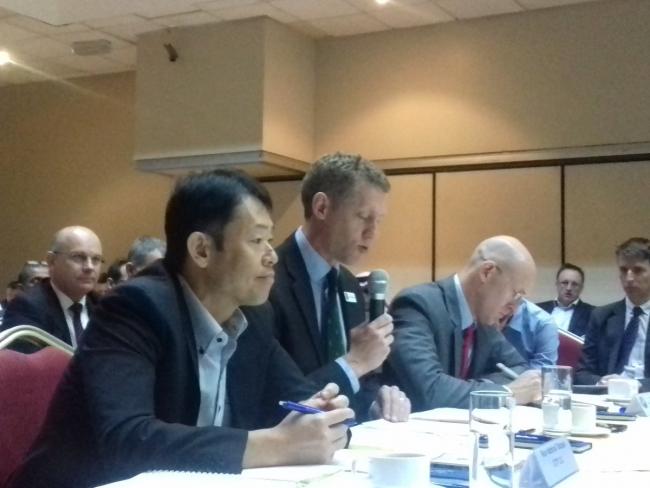The 40th Shared Awareness and De-Confliction (SHADE) conference took place in Bahrain between 25 – 26 April, with military and shipping industry representatives from 33 countries and 14 international organisations taking part in a range of discussions and forums.
The SHADE initiative began in 2008 as a way of coordinating activities with regards to counter-piracy operations and self-protection measures in the Gulf of Aden and Indian Ocean. Key aspects of the SHADE conference are the exchange of views and information sharing between all stakeholders.
SHADE is also used to discuss and coordinate the escort of merchant shipping through the Internationally Recommended Transit Corridor (IRTC), aerial coverage of the piracy high risk area by maritime patrol aircraft and coordinated efforts to deal effectively with the piracy threat.
Through the SHADE process, in early 2012 China, India and Japan agreed to coordinate their merchant vessel escorts in the ITRC, and by June 2012 South Korea had also agreed to do the same.
During the latest SHADE conference, there were representatives from the Combined Maritime Forces, including CTF 150 and 151, the United Kingdom Maritime Trade Organisation (UKMTO), EU NAVFOR, MSCHOA, Oceans Beyond Piracy (OBP), US Naval Forces Central Command (NAVCENT), NATO, United Nations World Food Programme, Puntland State of Somalia Minister for Transport, Regional Fusion and Law Enforcement Centre for Safety and Security at Sea (REFLECS3), Russian Ministry of Defence, Indian Navy, independent maritime security organisations and other industry partners.
Speaking on completion of the SHADE conference, EU NAVFOR’s Chief of Staff, Colonel Richard Cantril Royal Marines stated "Having just chaired the latest SHADE conference and reflecting on the responses to recent piracy incidents, I am struck by the willingness of all partners to cooperate in the face of a possible piracy resurgence and the human misery and disruption that this would cause to seafarers and vessels transiting the High Risk Area. Naval forces, the shipping industry and Somali partners are working together to understand the situation on the Horn of Africa and to cooperate in support of freedom of navigation."
The SHADE initiative began in 2008 as a way of coordinating activities with regards to counter-piracy operations and self-protection measures in the Gulf of Aden and Indian Ocean. Key aspects of the SHADE conference are the exchange of views and information sharing between all stakeholders.
SHADE is also used to discuss and coordinate the escort of merchant shipping through the Internationally Recommended Transit Corridor (IRTC), aerial coverage of the piracy high risk area by maritime patrol aircraft and coordinated efforts to deal effectively with the piracy threat.
Through the SHADE process, in early 2012 China, India and Japan agreed to coordinate their merchant vessel escorts in the ITRC, and by June 2012 South Korea had also agreed to do the same.
During the latest SHADE conference, there were representatives from the Combined Maritime Forces, including CTF 150 and 151, the United Kingdom Maritime Trade Organisation (UKMTO), EU NAVFOR, MSCHOA, Oceans Beyond Piracy (OBP), US Naval Forces Central Command (NAVCENT), NATO, United Nations World Food Programme, Puntland State of Somalia Minister for Transport, Regional Fusion and Law Enforcement Centre for Safety and Security at Sea (REFLECS3), Russian Ministry of Defence, Indian Navy, independent maritime security organisations and other industry partners.
Speaking on completion of the SHADE conference, EU NAVFOR’s Chief of Staff, Colonel Richard Cantril Royal Marines stated "Having just chaired the latest SHADE conference and reflecting on the responses to recent piracy incidents, I am struck by the willingness of all partners to cooperate in the face of a possible piracy resurgence and the human misery and disruption that this would cause to seafarers and vessels transiting the High Risk Area. Naval forces, the shipping industry and Somali partners are working together to understand the situation on the Horn of Africa and to cooperate in support of freedom of navigation."
